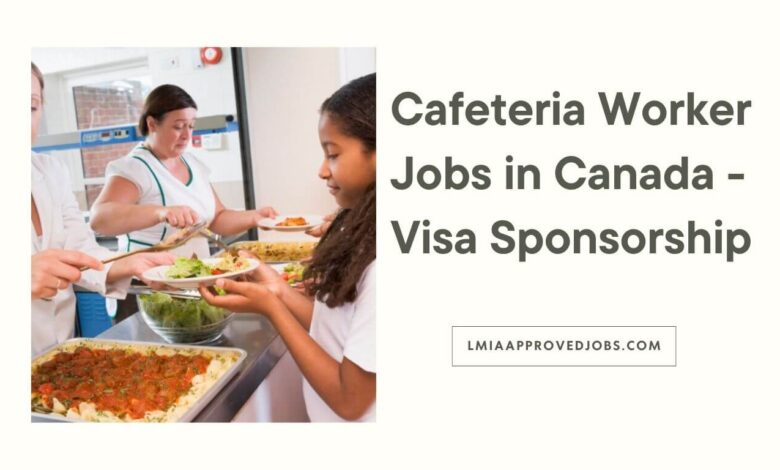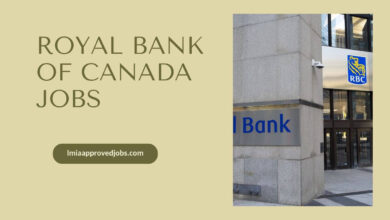Cafeteria Worker Jobs in Canada 2025 – Visa Sponsorship

Cafeterias are essential in the provision of fast and affordable meals to schools, hospitals, corporate offices, and public institutions, as Canada’s food service industry is experiencing significant growth. With the expansion of these institutions, there is a growing need for skilled and dependable cafeteria workers.
As a result, numerous employers are seeking international talent to fill these positions. Visa sponsorship opportunities are available to qualified candidates, simplifying the process of integrating foreign laborers into the Canadian workforce.
In this article, we will discuss the primary duties of cafeteria workers, the qualifications required, the companies that provide visa sponsorship, the application process, and the visa sponsorship process.
Check Also: Visa Sponsorship Companies Jobs in Canada – Apply Now
This position offers a valuable opportunity for international workers to access the expanding food service industry in Canada. This position provides a stable career path with the potential for long-term growth and opportunities for permanent residency, offering employment in a variety of environments, such as schools, hospitals, and corporate offices. You can begin your journey to working and residing in Canada as a cafeteria worker by adhering to the application and visa sponsorship process that has been outlined.
Insight into Cafeteria Worker Careers:
Cafeteria personnel are indispensable for guaranteeing the efficient operation of dining facilities in a variety of configurations, including hospitals, universities, schools, and office complexes. Their primary responsibilities include the preparation of food, the provision of customer service, and the preservation of sanitation in the cafeteria. These positions are frequently fast-paced and necessitate individuals who can operate effectively in a team-oriented setting.
The demand for cafeteria personnel has increased as Canada’s population continues to expand and institutions such as schools and healthcare facilities continue to expand. In an effort to facilitate the integration of foreign workers into the Canadian labor market, numerous Canadian employers are currently offering visa sponsorship to international candidates who satisfy the specific job requirements.
Key Responsibilities:
The specific responsibilities of a cafeteria worker may differ depending on the type of institution, but they typically include:
- Food preparation: Assisting in the preparation of basic meals, refreshments, or beverages, including soups, salads, and sandwiches.
- Food service: The act of providing meals to consumers in a timely and friendly manner, while ensuring that the quality of the food is maintained and the portions are consistent.
- Cleaning and sanitizing: The process of maintaining the cleanliness of the kitchen and dining areas, sanitizing surfaces, and scrubbing dishes or utensils.
- Restocking supplies: Guaranteeing that food items, beverages, and other supplies are consistently replenished and prepared for use.
- Customer service involves the resolution of customer inquiries, the processing of transactions, and the guarantee of customer satisfaction.
- Compliance with health and safety regulations: Ensuring that the work environment is clean and secure and that food safety protocols are adhered to.
Cafeteria employees frequently collaborate in teams, and their duties may involve prolonged periods of standing, the lifting of food trays, and the operation of culinary equipment.
Benefits:
- Entry-Level Employment That Is Easy to Access: For those who are new to the workforce or transitioning into a new profession, cafeteria worker positions are an excellent entry point, as they typically require minimal qualifications or prior experience.
- Wages That Are Competitive: Numerous cafeteria worker positions provide hourly compensation that frequently surpasses the minimum wage in specific provinces. Over time, there may be opportunities for pay increases that are contingent upon performance and experience.
- Stable Job Demand: In schools, hospitals, corporate offices, and government facilities, cafeterias are indispensable. The employment security of cafeteria workers is guaranteed by the consistent demand for food services.
- Adaptable Work Schedules: The scheduling of cafeteria roles is frequently flexible, with both full-time and part-time options available. These positions may also include daytime schedules, particularly in corporate and educational environments, which facilitates a more manageable work-life balance.
- Access to Training Programs: In order to guarantee that employees satisfy food safety and hygiene regulations, numerous employers implement on-the-job training. Additionally, employees may acquire certifications such as the Food Handler Certificate, which can improve their employment prospects.
- Work Environment That Is Positive: Teamwork and collaboration are frequently employed in cafeteria work, which cultivates an environment that is both welcoming and supportive. The work also contributes to the well-being of students, staff, or patients in school or hospital settings, providing a sense of fulfillment.
- Consistent Work Hours: In contrast to restaurant positions, cafeteria work frequently involves predetermined hours, particularly in institutions such as schools or offices. This predictability facilitates the planning of personal obligations and the preservation of a consistent routine.
- Opportunities for Networking: Cafeteria employees engage in daily interactions with customers, managers, and colleagues, which affords them the opportunity to establish professional relationships that may facilitate future career advancements.
- Free Meals and Employee Discounts: Numerous cafeterias provide employees with complimentary or discounted meals during their duties, which assists in decreasing their personal food expenditures.
- Opportunities for Social Interaction: A cafeteria position necessitates consistent interaction with customers and colleagues, rendering it an ideal occupation for those who derive pleasure from social settings.
Experience Requirements:
In order to gain employment as a cafeteria worker in Canada, particularly if you are seeking a job with visa sponsorship, there are several essential qualifications that must be fulfilled:
- Education: Typically, a high school diploma or its equivalent is necessary. Additionally, certain positions may necessitate food safety certifications, which can be acquired either domestically or internationally.
- Experience: Although prior experience in the food service industry is advantageous, numerous employers are amenable to employing entry-level employees and offering on-the-job training.
- Fluency in English is typically required, and knowledge of French is an asset in certain regions of Canada.
- Physical fitness is crucial for the position, as it frequently necessitates extended periods of standing and the operation of kitchen apparatus.
- Eligibility for a work permit: International candidates must satisfy the immigration requirements of Canada and obtain a valid work permit. Employers must be prepared to sponsor foreign laborers for visas.
Firms Recruiting Cafeteria Workers:
Across Canada, a variety of institutions, such as schools, hospitals, and corporate offices, employ cafeteria personnel and provide visa sponsorship to eligible applicants. The following are a few examples:
- Compass Group Canada
Compass Group is a prominent food service corporation in Canada that offers cafeteria services to corporate offices, schools, and healthcare facilities. They frequently recruit cafeteria employees and may provide visa sponsorship. Job Portal: Compass Group Careers - Aramark Canada
Aramark provides food services and facilities administration to corporate offices, healthcare organizations, and educational institutions throughout Canada. They frequently recruit cafeteria personnel and offer visa sponsorship to international candidates. Job Portal: Aramark Careers - Chartwells
Chartwells is a subsidiary of Compass Group that specializes in the provision of culinary services to educational institutions. They recruit cafeteria personnel for educational institutions and may provide visa sponsorship to qualified candidates. Job Portal: Chartwells Careers
Visa Sponsorship Application and Career Opportunities:
The visa sponsorship process for international laborers who aspire to become cafeteria workers in Canada typically entails the subsequent steps:
- Job offer: A Canadian employer who is willing to sponsor your visa must provide you with a valid job offer.
- Labour Market Impact Assessment (LMIA): Your employer may be required to obtain an LMIA, a document that demonstrates that there are no qualified Canadian workers available for the position. The employer may officially sponsor you upon the approval of the LMIA.
- Work permit application: Upon receipt of an affirmative LMIA, you are eligible to submit an application for a Canadian work permit. To complete this procedure, you must submit your job offer, and personal documents, and meet the medical and background check requirements.
- Visa confirmation: Upon the approval of your work permit, you will be granted a visa that enables you to work as a cafeteria worker in Canada.
- Permanent residency options: Through programs such as the Provincial Nominee Program (PNP) or the Canadian Experience Class (CEC), individuals who have acquired work experience in Canada may be eligible for permanent residency.
Guide to Applying for Cafeteria Worker Roles:
If you are interested in applying for a cafeteria worker position in Canada with visa sponsorship, please adhere to the following steps:
- Job search: Consult the career portals of the organizations mentioned above to identify job openings.
- Draft your curriculum vitae: Customize your resume to emphasize any pertinent experience in kitchen work, customer service, or food service. Your willingness to relocate and your capacity to operate in a fast-paced environment should be underscored.
- Submit your application via the company’s career portal or the job board. Ensure that you submit a cover letter that outlines your qualifications and enthusiasm for the position, as well as your willingness to relocate.
- Interviews: You will be summoned to an interview if you are chosen. Be prepared to engage in a conversation regarding your experience, your comprehension of food safety protocols, and the ways in which you can assist in the cafeteria’s operations.
- Confirm visa sponsorship: If you are offered a position, verify that the company will sponsor your visa and assist with the necessary documentation for your work permit.
Frequently Asked Questions:
-
What does a cafeteria do?
As a cafeteria worker, your primary responsibilities are to prepare and serve meals, typically for large groups of people. When preparing food, you adhere to any and all food preparation safety standards.
-
What is the main purpose of a cafeteria?
The main purpose of a cafeteria is to provide a convenient and efficient space where people can purchase and eat meals, typically within schools, hospitals, workplaces, or public facilities.
-
What are the benefits of a cafeteria?
Pre-tax contributions to a cafeteria plan lower your total taxable income and reduce income, Medicare, and Social Security taxes. Popular options include insurance, retirement plans, and benefits that help with life events such as adoption.



